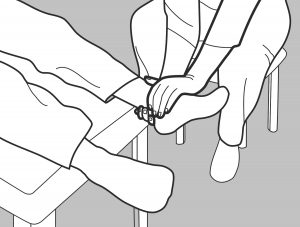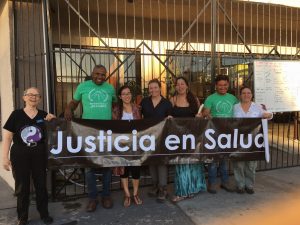Trauma Training Tip
The Lunar New Year on January 25, 2020 marked the beginning of the Spring or Wood season in Acupuncture and Asian Medicine (AAM). Sap starts running in the trees, we feel a spring in our step, and the promise of spring fills the air. The Wood Element mirrors the role of the Sympathetic Nervous System (SNS), which supports our capacity to “get up and go.”
AAM ascribes the spiritual quality of benevolence to the Wood Element. Our SNS is always “on” and available to fulfill its function to protect and defend us by helping us orient to threats and mobilize our fight or flight response. In addition to its important role to protect and defend us from threats — these ancient sages understood the critical and life-giving role of the forest to transform carbon dioxide into oxygen as a foundation for life. The Wood Element is clearly benevolent!
However, the Wood’s benevolent nature can turn into its opposite if our fight or flight response has been thwarted or left incomplete. In our innate drive to complete what was left incomplete, we make mistakes about the level or nature of our mobilization response. We either don’t defend ourselves well, or our reactions are “over the top,” and we may engage in violent or angry outbursts that are not commensurate with the threat we are experiencing.
 We need our Parasympathetic Nervous System (PNS) — especially our “social” or ventral vagus nerve — to counterbalance the SNS so that our mobilization responses are thoughtful, considerate of others, and consider our own long-term health and welfare as well as the impact on the generations that will come after us.
We need our Parasympathetic Nervous System (PNS) — especially our “social” or ventral vagus nerve — to counterbalance the SNS so that our mobilization responses are thoughtful, considerate of others, and consider our own long-term health and welfare as well as the impact on the generations that will come after us.
Helping our clients observe the presence or absence of their instinct to protect and defend can help wake up thwarted responses remaining behind from incomplete fight or flight responses in their past.
 The tendons and ligaments are the tissues associated with the Wood Element — so paying attention to the joints can be a particularly useful place to look for thwarted mobilization responses.
The tendons and ligaments are the tissues associated with the Wood Element — so paying attention to the joints can be a particularly useful place to look for thwarted mobilization responses.
More to come in the next few months about the Wood Element and our mobilization response.
Alaine’s Two Cents
When we are in a state of fear, we are more vulnerable to making mistakes in our instinct to protect and defend. We may have a “backed into a corner” feeling that calls us to lash out in aggressive ways, and be something less than thoughtful about the impact of our choices on other people, especially those who we perceive to be different from us. We lose our capacity for compassion.
Moving these experiences out of our tissues can help reduce tragic events of workplace tension, domestic violence, child abuse, or community shootings.
Our nation needs its healers!
Check This Out!
The Peace and Social Concerns Committee of Adelphi Friends Meeting has asked me to share reflections on the work of Acupuncturists Without Borders of the National Capital Area — serving immigrants and refugees in Langley Park, MD in partnership with CASA, and on my recent trip to Tijuana, Mexico with the national Acupuncturists Without Borders.
Friday, February 21st from 6:30-8:30 p.m.
@ Adelphi Friends Meeting House
2303 Metzerott Road
Adelphi, MD 20783
A Tex-Mex dinner will be served at 6:30 p.m, with the program starting at 7 p.m. Tax deductible donations to support acupuncture treatment locally and at the border are welcome. Children welcome — as are YOU!
Please RSVP here to us know if you plan to attend so we can plan for food.
Clinical Curiosity
Where is your clinical curiosity carrying you?
Send me a question or two and I will explore them with readers in this corner next month.
Q. What do you do when a client comes in with physical problems they desperately want help with, and while you have a hunch that their symptoms are related to an overwhelming experience sometime along the way, they aren’t ready or don’t want to look to either their current emotions or their emotional history? I’m an acupuncturist.
A. This is a classic question. Thank you for it.
People have a wide range of “tickets for admission” to acupuncture treatment. They may not be aware that their chronic pain or digestive upset or insomnia has anything to do with dysregulation in their autonomic nervous system.
Honoring their complaint, as spoken in their words is really critically important. You can’t possibly have a joint understanding on which to ground their consent without really understanding what brings them in. Ongoing consent requires a clear agreement on what you both understand about their situation, and their permission for your interventions.
You don’t really need their “story” in order to help restore regulation to their energy body – good thing! It may not be helpful to them to relive their trauma-log and it’s easier on you to not go through overwhelming stories all day long too.
It’s up to us to expand their understanding of themselves and what brings them in. Language like “when we experience an overwhelming event, we may either brace in response, or we may collapse – these states can contribute to the kinds of symptoms you are having in your (joints, guts, mood, etc.). I’ve found that if I take time and give attention to helping my patients’ nervous systems feel balanced and regulated, that a lot of these kinds of symptoms float away.”
“I’d like to take a few minutes to hold your kidney/adrenal system – because both Western science and Eastern science recognize it as an important player in our stress response. Then the needles I use to help you with your (joints, guts, mood, etc.) will be able to be more effective.”
How does that sound to you? No need to arm-wrestle our clients into exploring territory they don’t feel comfortable, ready, or aware of in order to be of service. If you were a mental health provider, you would have a different scope of practice and a different relationship to people’s “story.” Acupuncturists can simply help restore balance and regulation to the energy body – and make a world of difference in the story – without ever knowing the details.
Let me know how this works!


